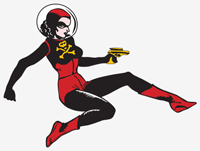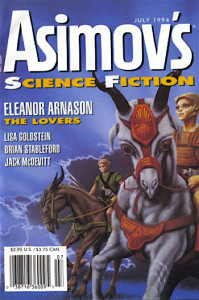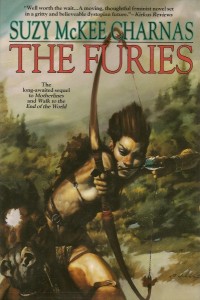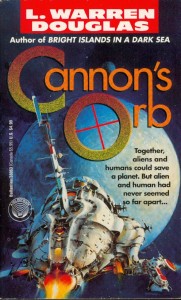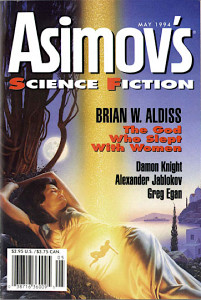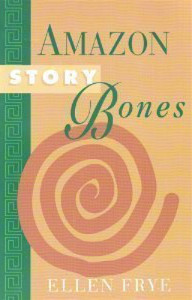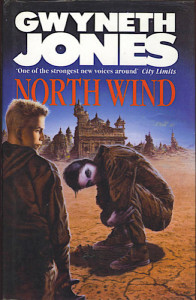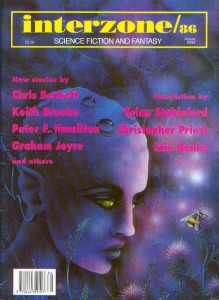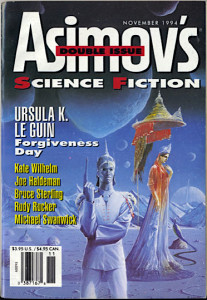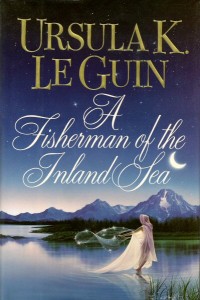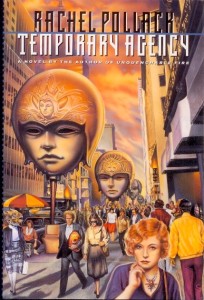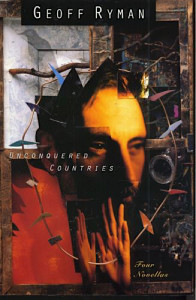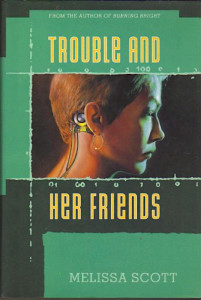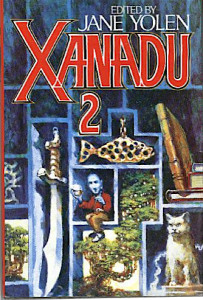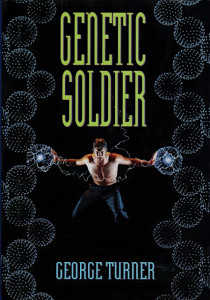In addition to selecting the winner, each jury chooses an Honor List (previously called a “Short List”). The Honor List is a strong part of the award’s identity and is used by many professors as a guide to creating syllabi and by many readers as a recommended reading list.
Honor List
The 1994 jury chose 14 works for the Honor List
Arnason has explored this territory before but finds new insights this time around. The story concerns heterosexual love in a world that allows no such thing. The lovers convincingly embody gender choices that neither their society nor ours is quite prepared to sanction. — Brian Attebery Like Arnason’s other “hwarhath” stories, this poignant tale explores gender on several levels, like a mobile of mirrors that catches new reflections with each turning. Neither Eyes-of- Crystal nor Eh Shawin is a revolutionary, yet their love both grows from and profoundly challenges the deepest assumptions of their society. By incorporating comments about the “author” of the tale, and finally its evidently human translator/editor (who might well be Anna Perez of Ring of Swords), Arnason sketches a broader timescape of a culture in transition. I’m impressed! — Susanna J. Sturgis This story is in Flying Cups and Saucers. Charnas follows up her groundbreaking novels about Free Fems and Riding Women with a dark and challenging story of revenge. The Free Fems have returned to Holdfast in order to tear it down. The question that is never resolved is whether they will be able to make a new life for themselves and the remaining men. Amid uncertainty, bitterness, and betrayal, the heroine of the earlier books struggles to keep the Free Fems from become what they have escaped from. — Brian Attebery The 1994 jury was both blessed and cursed with an abundance of riches. This is a book that not only encourages but forces the reader to question assumptions about gender. It connects the words/ideas “women” and “power” and “violence” in a way few authors have ever cared or managed to. — Ellen Kushner This continuation of Walk and Motherlines is powerful, brooding, and extremely dark. Somebody commented that the two previous novels embodied key moments in the history of feminism; if that is so, then The Furies shows we live in interesting times (in the Chinese sense). It shows women turning on men, then on themselves, but battles in the end towards a type of understanding, if not forgiveness. Very few novels indelibly impress upon the mind, and this is one of them. — Lucy Sussex Like its predecessors, Walk to the End of the World and Motherlines, The Furies explores the consequences, for both women and men, of a violently patriarchal society. Here at last the Riding Women, who have never been either slaves or slave owners, see the Free Fems in the latter’s own context-which is to say that they really see the Free Fems for the first time. There are acts of excruciating violence in this book, men against women, women against men, women against women; such is the power of the writing that I couldn’t look away. The Furies is one of the most important feminist novels I’ve ever read-why then did it place a shade behind the winners of this year’s Tiptree Award? Because its brilliance lies not so much in exploring and expanding gender roles-here The Furies clearly builds on the earlier books-but in asking the unaskable questions about revolutionary change, and in imagining, and facing, the unimaginable answers. What shapes the relationship of liberator and liberated? Leader and led? What to do with the despised but indispensable former oppressor? Langston Hughes asked what happened to a dream deferred; Suzy McKee Charnas asks what happens to a dream on the verge of fulfillment. — Susanna J. Sturgis Like Genetic Soldier, this novel hypothesizes that pheromones control large areas of human behavior that we think are rational. Contact with an alien race has altered human pheromones, with the result that everything from sexual cycles to xenophobia is transformed. The book takes a wrong turn toward the end, but in the interim a lot of assumptions about gender and society are questioned. — Brian Attebery The book begins in an interesting fashion-examining the biological roots of human behavior. But starting from there, the story went in a direction that reinforces our cultures biases in what I consider to be a totally wrong- headed fashion. According to my reading of Canon’s Orb, the biological role of women is to control from behind the scenes by flattering and bolstering the ego of the man they have chosen as the alpha male. Women gain their power by supporting men. It sent chills up my spine-and I mean the wrong kind of chills. Because I had such a visceral reaction to the book, it did force me to examine my beliefs related to gender. — Pat Murphy A frightening, and all too credible account of what might happen if corporate R&D capitalism ever decides to really cash in on homophobia. A scientific thriller par excellence. — Lucy Sussex The opening stories, revised myths from a feminist perspective, seem a little smug, and I don’t believe traditional mythic figures ever talk quite so much. But when it gets to the central narrative, about the fall of Troy and its impact on the lives of Amazons and other women, the book is powerful and convincing. One of the most interesting touches is that the Amazons are never actually there-they’re either anticipated, in the mythic sections, or sought, in the more naturalistic narrative. They’re a possibility that changes the world, rather than an actuality that can be pushed into the margins. — Brian Attebery Who says that history has to be written by the winners? A tantalizing, evocative account of some of the lesser-known losers of the Trojan war, and how their herstory might have been; at its best when rewriting Homer. — Lucy Sussex This book’s Amazons are always off-stage. They are a promise and an inspiration. I like that. — Pat Murphy A fine, not to mention rare, example of what can happen when feminism and fantasy marry. The myths that open the book read like a First Contact tale; familiar gods and heroes are seen through the bemused, benevolent, and often fatally naive eyes of the goddesses they displace. A generation or so after the fall of Troy, a young girl, Iphito, dreams of the near-legendary Amazons and listens to the stories of two old women, one an Amazon herself. This unconventionally structured novel both describes and embodies how storytelling can expand gender roles, especially by sparking the imagination of girls. — Susanna J. Sturgis In this follow-up to the Tiptree-winning White Queen, Gwyneth Jones continues to redivide the gender pie in most interesting ways. There is a war going on between Men and Women-but the Men are not necessarily men. There are also aliens of undoubted sexuality but disputed gender. The narrative itself alternates between masculine and feminine pronouns for one of the main characters, depending on whose perceptions are being echoed. — Brian Attebery A writer friend recently opined, apropos of White Queen that there is more in Gwyneth Jones’ paragraphs than there is in most novels. North Wind is a worthy follow-up to her earlier Tiptree winner, dense with ideas to the extent of almost being too much of a good thing. A fascinating read. — Lucy Sussex A study in demonizing the Other, in this case hermaphrodites. Even the sympathetic hero is implicated in their oppression, until the seemingly innocuous Reecebread of the title solves the problem. — Brian Attebery The narrator, an English police officer in the not-too-distant future who falls in love with a hermaphrodite, tries to steer a course between the violent hatred of his colleagues and what he perceives as the extremism of some hermaphrodites-with predictably tragic results. Like several other works considered by the 1994 jury, this draws elements of Romeo and Juliet, not to mentionGuess Who’s Coming to Dinner? and The Crying Game, into the service of defusing hostility to gender difference. — Susanna J. Sturgis This story is in Flying Cups and Saucers. Like “Young Woman in a Garden,” this novella explores the undermining of the assumptions about class, culture, and gender, dearly held by each protagonist, with immense compassion for both-and, by extension, all the rest of us. I loved the choice of “asset” to describe the slaves/bondspeople; it neatly extends the concept of unfreedom into the so-called free marketplace. — Susanna J. Sturgis This story is in Flying Cups and Saucers. The title story interacts intriguingly with “The Matter of Seggri.” The world of O could not be more different in its sexual arrangements from the strict separation of Seggri. A marriage on O requires two women and two men, each interacting sexually with two of the others-but not with the partner of the same moiety. That would be immoral. This is a story about having it both ways: not only heterosexual and homosexual but also living two different lives, thanks to the paradoxes of Churten physics. — Brian Attebery Just about my favorite part of this collection was the Introduction, “On Not Reading Science Fiction,” in which, with her usual quiet panache, Le Guin nails the use and purpose and intent of science fiction for even the meanest intelligence to perceive. — Ellen Kushner Though I enjoyed all of the stories in this collection, I recommend it for the shortlist because of one story in particular: “Another Story.” Le Guin is second to none in imagining interesting cultures. The culture in “Another Story” has marriage customs that, quietly and matter-of- factly, stand our assumptions on their ear. — Pat Murphy “Another Story, or A Fisherman of the Inland Sea,” the only 1994 story in this collection, “only” redefines family and provides a scenario whereby one really can, in certain circumstances, go home again. Clearly a shortlist contender in its own right, it’s ably amplified by its impressive company here. Read, or reread, “Newton’s Sleep,” in which what one doesn’t see refuses to go away”; “The Rock That Changed Things”; and especially “Dancing to Ganam.” Reality, said Lily Tomlin’s Trudy, is “nothing but a collective hunch;” Ursula Le Guin shows how it works. — Susanna J. Sturgis I liked about this book for its matter-of-fact use of demons and magic in an otherwise contemporary world. As for the book’s gender-bending credentials-Ellen, the main character, is a strong-minded, capable, heroic young woman (she’s a teenager at the start and an adult by the end), she ends up in a relationship with another woman; a group of transgender hackers assists her in her work. And (here’s the big one for me) in the end, Ellen and her lover, using limited resources and their wits, save the world. I’m always so happy when women save the world. — Pat Murphy There is virtually nothing Geoff Ryman writes that does not explore gender or sexuality; his hand is so steady on that wheel that he can steer the vessel off in completely other directions, and still have more to say on gender than do many stories that use it as their focal point. While other writers struggle with questions of, “Gosh, can women be strong and nontraditional, and men complex and conflicted, and how can I show it …?” Ryman’s assumption is that they not only can be but already are; he begins there, and takes the work where he wants it to go. This collection is notable for his 1994 story “A Fall of Angels, or On the Possibility of Life under Extreme Conditions.” — Ellen Kushner I’d recommend this for the shortlist because “O Happy Day!,” one of the four novellas it includes, is a powerful examination of the consequences of gender and power and violence. In this world run by women, a group of gay men are the cleanup crew in a concentration camp where heterosexual men are exterminated. The story takes place in a concentration camp It’s a powerful and gripping story, one that I find impossible to ignore. — Pat Murphy Wild grrls invade the cyberpunk boys’ club. Trouble and her friends are virtual amazons, at home inside the virtual world and outside the law. The story includes a lot of weird hardware, an on-line cross-dressing seducer, and a genuine love story between prickly Trouble and independent Cerise. — Brian Attebery Lesbian relationships in F/SF, still lamentably scarce, tend to take place either on the peripheries of the main story or in societies-like those of last year’s winner, Ammonite-where there are no men. Had Melissa Scott done no more than put Trouble and Cerise front and center in a near-future U.S., this novel would be worth celebrating. But Scott goes much further, exploring the challenges to and implications of unconventional relationships in a vivid social context. She uses the gender ambiguity of the virtual world to play an erotic joke on one of her protagonists, and to have fun with a U.S. mythos that generally excludes women: the Wild Wild Western. Perhaps most important, she examines with compassion and insight the slow recovery of a partnership from desertion and betrayal. — Susanna J. Sturgis Delia Sherman delicately undercuts assumptions about gender and art with this time fantasy about an artist, a lover, a model, and a scholar, none of whom are exactly the person one expects. — Brian Attebery A lovely, haunting story that puts gender considerations in an intriguing historic perspective. — Pat Murphy A young American graduate student finds more than a dissertation topic in this beautifully written story. True to its central imagery, the tale is about learning how to see what lies in plain sight, and here the “what” has much to do with assumptions about gender and sexuality, not to mention the complex relationship of artist/scholar and subject. — Susanna J. Sturgis This story is in Flying Cups and Saucers. In the future Earth of this book, social roles are predestined by genes and enforced by pheromones. Some are mothers, some are soldiers. Turner combines social and biological extrapolation to produce a very strange world that is at the same time a mirror of our own. — Brian Attebery The influence of pheronomes on sex roles has been explored recently in SF, but seldom with the narrative edge of Turner. A fascinating exploration that rewrites the theme of star-crossed lovers most nastily and inventively. If anything, this is a metaphysical thriller, with gender ultimately transcended. — Lucy SussexThe Lovers by Eleanor Arnason (Bantam Doubleday Dell Magazines, 1993)
Work Information
Title: The LoversAuthor: Eleanor ArnasonCollection:
Title: Asimov's Science Fiction July 1994Editor: Gardner DozoisPublisher:
Publisher Name: Bantam Doubleday Dell MagazinesCountry: USYear: 1993The Furies, Holdfast Chronicles Book 3, by Suzy McKee Charnas (Tor, 1994)
Work Information
Title: The FuriesAuthor: Suzy McKee CharnasSeries:
Series Title: Holdfast ChroniclesSeries Number: 3Publisher:
Publisher Name: TorCountry: USYear: 1994Cannon's Orb, Phastillan Book 2, by L. Warren Douglas (Del Rey / Ballantine, 1994)
Work Information
Title: Cannon's OrbAuthor: L. Warren DouglasSeries:
Series Title: PhastillanSeries Number: 2Publisher:
Publisher Name: Del Rey / BallantineCountry: USYear: 1994Cocoon by Greg Egan (Bantam Doubleday Dell Magazines, 1994)
Work Information
Title: CocoonAuthor: Greg EganCollection:
Title: Asimov's Science Fiction May 1994Editor: Gardner DozoisPublisher:
Publisher Name: Bantam Doubleday Dell MagazinesCountry: USYear: 1994Amazon Story Bones by Ellen Frye (ed.) (Spinsters Ink, 1994)
Work Information
Title: Amazon Story BonesEditors: Ellen Frye (ed.)Publisher:
Publisher Name: Spinsters InkCountry: USYear: 1994North Wind, The Aleutian Trilogy Book 2, by Gwyneth Jones (Gollancz, 1994)
Work Information
Title: North WindAuthor: Gwyneth JonesSeries:
Series Title: The Aleutian TrilogySeries Number: 2Publisher:
Publisher Name: GollanczCountry: UKYear: 1994Eat Reecebread by Graham Joyce, Peter F. Hamilton (David Pringle, 1994)
Work Information
Title: Eat ReecebreadAuthors: Graham Joyce, Peter F. HamiltonCollection:
Title: Interzone #86 August 1994Editors: David Pringle, Lee MontgomeriePublisher:
Publisher Name: David PringleCountry: UKYear: 1994Forgiveness Day by Ursula K. Le Guin (Bantam Doubleday Dell Magazines, 1994)
Work Information
Title: Forgiveness DayAuthor: Ursula K. Le GuinCollection:
Title: Asimov's Science Fiction November 1994Editor: Gardner DozoisPublisher:
Publisher Name: Bantam Doubleday Dell MagazinesCountry: USYear: 1994A Fisherman of the Inland Sea by Ursula K. Le Guin (HarperPrism, 1994)
Work Information
Title: A Fisherman of the Inland SeaAuthor: Ursula K. Le GuinPublisher:
Publisher Name: HarperPrismCountry: USYear: 1994Temporary Agency, Unquenchable Fire Book 2, by Rachel Pollack (St. Martin's Press, 1994)
Work Information
Title: Temporary AgencyAuthor: Rachel PollackSeries:
Series Title: Unquenchable FireSeries Number: 2Publisher:
Publisher Name: St. Martin's PressCountry: USYear: 1994Unconquered Countries: Four Novellas by Geoff Ryman (St. Martin's Press, 1994)
Work Information
Title: Unconquered Countries: Four NovellasAuthor: Geoff RymanPublisher:
Publisher Name: St. Martin's PressCountry: USYear: 1994Trouble and Her Friends by Melissa Scott (Tor, 1994)
Work Information
Title: Trouble and Her FriendsAuthor: Melissa ScottPublisher:
Publisher Name: TorCountry: USYear: 1994Young Woman in a Garden by Delia Sherman (Tor, 1994)
Work Information
Title: Young Woman in a GardenAuthor: Delia ShermanCollection:
Title: Xanadu 2Editor: Jane YolenPublisher:
Publisher Name: TorCountry: USYear: 1994Genetic Soldier by George Turner (AvoNova / William Morrow, 1994)
Work Information
Title: Genetic SoldierAuthor: George TurnerPublisher:
Publisher Name: AvoNova / William MorrowCountry: USYear: 1994
